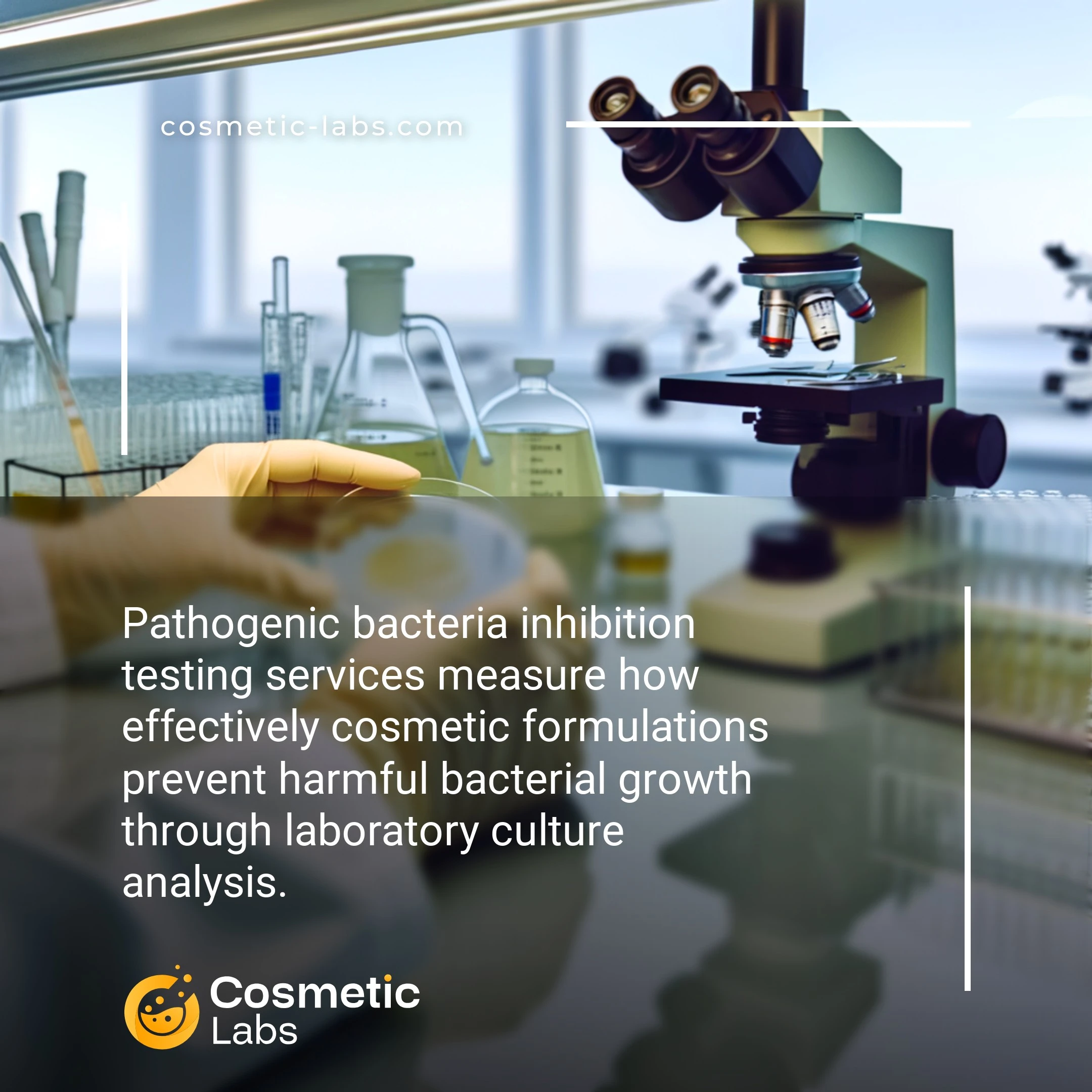Pathogenic Bacteria Testing Services for Cosmetic Safety

What is Pathogenic bacteria inhibition testing?
Pathogenic bacteria inhibition testing services evaluate how effectively your cosmetic formulations prevent harmful bacterial growth on skin surfaces. Labs use standardized protocols like challenge tests with Staphylococcus aureus and Propionibacterium acnes to measure your product’s antimicrobial activity over 24-48 hour periods. This testing reveals whether your preservative system can maintain product safety while supporting beneficial skin microbiota, helping you develop formulations that protect without disrupting the skin’s natural bacterial balance.
Why do you need this service?
Beauty brands rely on antimicrobial efficacy testing to validate preservative systems in creams, serums, and makeup formulations before market launch. Labs conduct challenge tests against Staphylococcus aureus, E. coli, and Candida albicans to ensure your products meet regulatory standards while maintaining shelf stability for 24-36 months. This testing prevents costly recalls and protects brand reputation by confirming formulations resist harmful microorganisms throughout their commercial lifespan.
Who provides Pathogenic bacteria inhibition testing services?
All cosmetic labs providing Pathogenic bacteria inhibition testing services
There is no company providing these services at the moment.
Pathogenic Bacteria Inhibition Testing Services
Pathogenic bacteria inhibition testing validates your cosmetic formulations’ ability to prevent harmful bacterial growth on skin. This antimicrobial testing complements skin microbiota efficacy studies by focusing specifically on disease-causing organisms that can compromise skin health and product safety.
Laboratory Testing Protocols
Labs test your formulations against specific pathogenic strains including Staphylococcus aureus, Pseudomonas aeruginosa, and Escherichia coli. Testing protocols measure minimum inhibitory concentrations (MIC) and zone of inhibition diameters to quantify antimicrobial activity.
Standard testing methods include:
- Disk diffusion assays for initial screening
- Broth microdilution for precise MIC determination
- Time-kill studies for bactericidal activity assessment
- Biofilm inhibition testing for surface-adherent bacteria
Results provide concrete data on your product’s protective capabilities against specific pathogens.
Regulatory Compliance Applications
These tests support regulatory submissions by demonstrating your product’s antimicrobial properties without making drug claims. Pathogenic bacteria inhibition data helps brands position products as protective skincare while meeting safety requirements.
Testing applications include:
- Acne treatment formulations targeting Propionibacterium acnes
- Wound care products preventing secondary infections
- Deodorant formulations controlling odor-causing bacteria
- Intimate care products maintaining healthy pH balance
Connect with specialized labs on our platform to discuss your specific pathogen testing needs and regulatory requirements.
Applications of Pathogenic Bacteria Inhibition Testing Services
Cosmetic brands rely on pathogenic bacteria inhibition testing services to validate antimicrobial claims and ensure product safety across diverse formulations.
Antimicrobial Skincare Product Development
Labs evaluate how well acne treatments, cleansers, and spot treatments inhibit Propionibacterium acnes and Staphylococcus epidermidis growth. Testing protocols measure minimum inhibitory concentrations (MIC) and zone of inhibition diameters to quantify antimicrobial efficacy.
Product developers use these results to optimize active ingredient concentrations and support marketing claims. Testing typically requires 7-14 days and covers both planktonic bacteria and biofilm formation patterns.
| Target Pathogen | Common Applications | Testing Duration | Key Metrics |
|---|---|---|---|
| P. acnes | Acne treatments, cleansers | 7-10 days | MIC, zone diameter |
| S. aureus | Wound care, antiseptics | 5-7 days | Log reduction, kill time |
| E. coli | Intimate care products | 3-5 days | CFU count, inhibition % |
Preservative System Validation
Brands test preservative blends against pathogenic strains to meet regulatory requirements and extend shelf life. Labs challenge formulations with Pseudomonas aeruginosa, Escherichia coli, and Staphylococcus aureus following ISO 11930 protocols.
Results determine if preservative systems achieve required log reduction values within specified timeframes. This data supports global registration requirements and helps formulators adjust preservative concentrations before full-scale production.
Ready to validate your product’s antimicrobial performance? Contact specialized labs on our platform for pathogenic bacteria inhibition testing that meets your regulatory and efficacy requirements.
